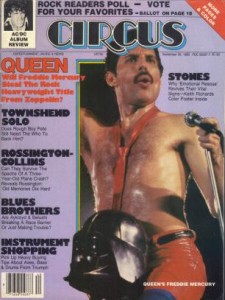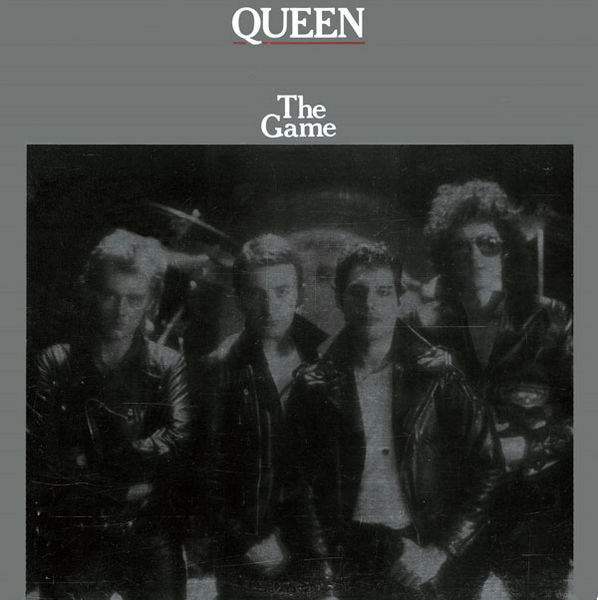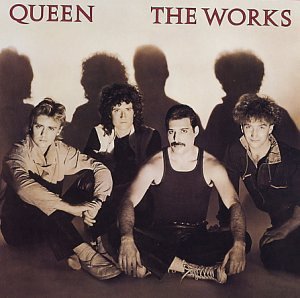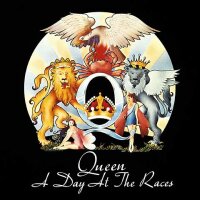09-30-1980 – Circus Magazine
Lights! Action! Sound! It’s that crazy little thing called Queen!
by Lou O’Neill Jr.
 Who would have thought that nine long years and nine albums later Queen would still be riding a wave of unequalled success? The band’s new Elektra album, The Game, is a logical extension of Queen’s most recent direction: a blend of rockabilly with new wave overtones. That Freddie Mercury loved Elvis is evident in the fact that Crazy Little Thing Called Love is included on the LP and performed prominently during the current tour. In addition, Elvis’s Jailhouse Rock has become a standard in Queen’s set.
Who would have thought that nine long years and nine albums later Queen would still be riding a wave of unequalled success? The band’s new Elektra album, The Game, is a logical extension of Queen’s most recent direction: a blend of rockabilly with new wave overtones. That Freddie Mercury loved Elvis is evident in the fact that Crazy Little Thing Called Love is included on the LP and performed prominently during the current tour. In addition, Elvis’s Jailhouse Rock has become a standard in Queen’s set.
People in Los Angeles were surprised to see Freddie Mercury with a guitar in his hands at Queen’s recent Forum concerts. For the first time ever, Freddie Mercury is playing guitar during a Queen concert. He uses an Ovation twelve-string acoustic on Crazy Little Thing Called Love.
‘It took sheer guts and bravery,’ Freddie told Circus, recalling the first time he walked out on stage with a guitar. ‘The first couple of nights were nerve-wracking, but it was okay after that. You see, I wrote Crazy Little Thing on guitar and played rhythm on the record, and it works really well because Brian gets to play all those lead guitar fills as well as his usual solo. I’m somewhat limited by the number of chords I know. I’m really just learning, but I hope to play more guitar in the future.’
Freddie Mercury will have his chance to improve on guitar, since Queen is currently in the midst of another American tour. Unlike past Queen campaigns which usually took place during winter months, this tour has been warm-weather all the way. It began on the west coast at the end of June and will climax with three nights at Madison Square Garden in New York on September 28, 29 and 30. By then, a collection of Queen’s greatest hits, should be in the stores, to be followed by their soundtrack to the Dino De Laurentils production of Flash Gordon for which they’ve written 40 minutes of brand new music.
Unlike many other rock groups that struggled for years to reach the top, Queen got there instantly by conventional standards. It began to fall into place in 1968 when then 22-year-old Freddie Mercury met Brian May and Roger Taylor, at the time members of the British rock band, Smile. After Smile’s only U.S. single failed to go anywhere, Freddie got his chance to join later in 1971.
Queen’s fiery guitarist, Brian May, insists Freddie has never changed. ‘Even back then, Freddie knew he would be a star,’ Brian recalled. ‘He had no money in his pocket, no success to speak of yet, or even any hope of success, but it didn’t stop him. He acts the way he does because that’s the way he really is. He has never changed in all the years I’ve known him; he’s still the same Freddie.
Born Frederick Bulsara in Zanzibar on September 5th 1946, Freddie attended boarding school in Bombay at age seven. His education continued and it was thought young Freddie might become an athlete, but by age 18 he was off to London Art School where he studied illustration. To this day, the artistic flair is still a prime ingredient in Queen’s stage show.
In addition to playing the States during the warmer weather, the current Queen tour is also different in that each segment is strictly limited. In the past, the band would arrive and play straight through to the end of the tour. this time Queen is doing it in bits and pieces.
‘It’s funny,’ Roger Taylor commented, ‘because on this trip over the pressure isn’t as great as in the past when we would have two, sometimes three months facing us without a break. We’d actually play until we dropped. Now, we’re in a better frame of mind and our decision has proved correct.’
In addition to the U.S., Queen’s current tour will take in Mexico and South America for the first time. They’ll also appear in the Far East, Europe and England, where they capped off their last tour in December with a benefit concert in London. Paul McCartney personally asked them to participate with the Who, the Clash, Ian Dury, Elvis Costello, and Wings in the week-long series of shows for the people of Kampuchea.
Backstage, Brian explained Queen’s concept of performing. ‘We always joke about it,’ he said, ‘but it’s true. Our tours are not designed to make money. They’re really not. We sometimes say we’ll do a tour and come home with ten pounds apiece because of all the money we spend on production. Each successive tour costs more than the one before it. Maybe it’s inflation, but we really do view our tours as break-even propositions.’
Queen’s tours are among the most lavish in rock. Sometimes five or six limousines are used to chauffeur the band and no expense is spared. It’s first class or nothing for Queen. For example, the new album, recorded at Munich, Germany’s Musicland Studios, took over eleven months to make. Since there are only ten tracks on the album, the studio costs were substantial, but the wait was worth it. Witness Another One Bites The Dust, sure to be the band’s third single culled from the album. Another One has ‘crossover’ written all over it and even New York’s trendy R&B outlet WBLS, the nation’s highest-rated Fm station, is programming it regularly.
Each track from The Game is refreshing. Leaving Crazy Little thing Called Love on the LP was a stroke of marketing genius. Since the single never appeared on a Queen record, it served as a connecting point between older and more recent Queen material. In some ways Crazy Little Thing Called Love softens the harder-edged sound of the other tracks on The Game. Rock It (prime jive) picks up the threads of Tie Your Mother Down.
That Queen has included just the right mix of material on The Game was amply evident in Britain. the album entered the charts there at Number Two behind The Stones’ Emotional Rescue. One week later, Queen had knocked the Stones out of first place on the album charts. They had done it again.
But how has this unlikely foursome managed to remain at the pinnacle of rock for nearly a decade without faltering? Other bands have come and gone, but Queen remains. Disco is only a fleeting memory, but the musical juggernaut of Freddie Mercury and company continues to roll on unimpeded.
‘I guess you can say control has a lot to do with it,’ John Deacon comments. The 29-year-old bassist handles a good portion of Queen’s business affairs, no small task since the group manages itself.
Brian May told journalist Mary Turner control was the key to Queen’s success. ‘We know when we do things our way, the standards will be high.’ May also offered up a thumbnail sketch of fellow band members. On Roger Taylor; ‘He’s the Peter Pan of rock!’
What about Freddie Mercury? Brian May calls Freddie ‘the quintessential lead singer in rock & roll. The fire and glue that holds Queen together.’
And John Deacon? As note, the youngest member of the band is heavily involved in the business side of Queen. Says Brian, ‘John’s got a good business mind. He also has a complete sense and understanding of rhythm and how rock and business work together.’
Ironically, for a band that’s achieved the success and prominence of Queen, remarkably little is known about their private lives. ‘That’s the way we like to keep it.’ Brian explained. ‘We find things work out better if we keep what’s private just that, private.’
However in public, notes New York concert promoter Ron Delsener, ‘Queen has remained one of the world’s top drawers. It’s as simple as that. The key to their success is very simple. They never have gone to the well too often. Their appearances are well spaced and they certainly don’t over expose themselves. They leave them calling for more and that’s the secret of success in show business. To leave them dying for more.’
Kal Rudman, publisher of the radio industry newsletter The Friday Morning Quarterback, echoes Delsener’s sentiments. ‘Freddie Mercury writes hits,’ Rudman says. ‘There’s no other way to describe him except to say he’s a born writer. Brian May is the same way.
‘I don’t know how they’ve done it, to be honest,’ he continues. ‘For all these years, they’ve fought every new fad that was out to blow them away. Disco? Hell, Queen ate disco up and spat it out for breakfast! You don’t see that many groups around anymore that have never experienced changes or that are still with the same record company they originally signed with. Queen is the exception to every rule I know about. they have maintained their freshness. they have discovered eternal youth.’
Jeff Smith, the 20-year-old son of Elektra-Asylum’s president Joe Smith and a summer intern at The Friday Morning Quarterback, echoes Rudman’s remarks. ‘When my father came to Elektra, Queen had not yet achieved the potential he felt they had. My dad sank a million dollars into Queen figuring it was a good investment and that, in the long run, we’d get it all back with plenty to spare.’ How right he was!
Like Britain’s sleek and supersonic Concorde, Queen has never stopped climbing.



